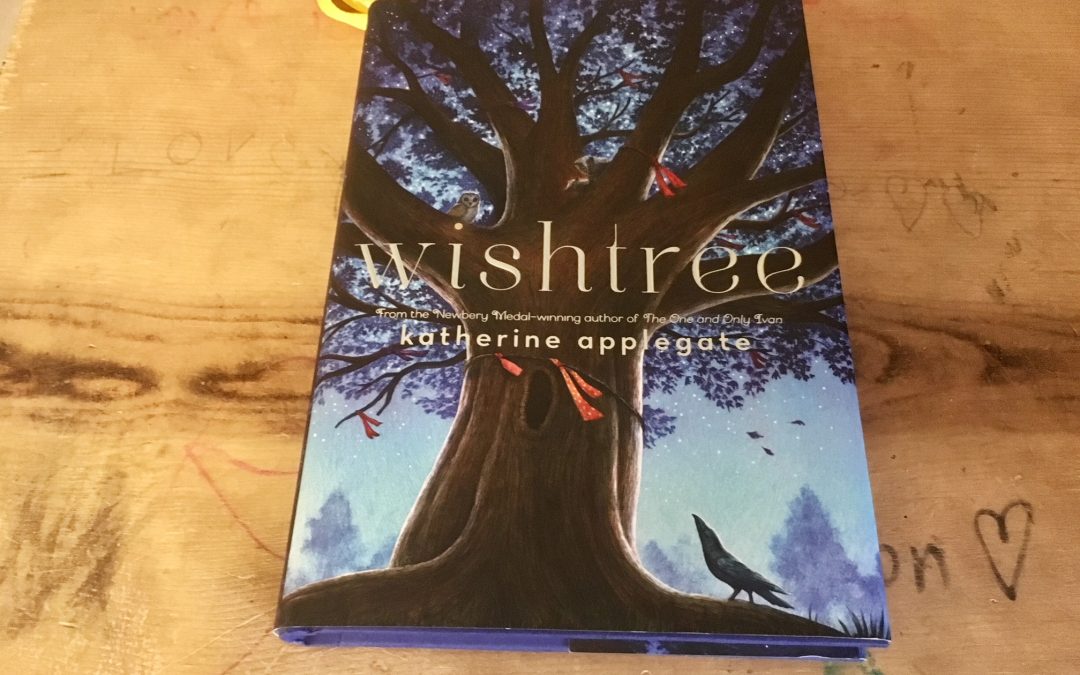
by Rachel Toalson | Books
I have been reading Katherine Applegate for a long time. When kids ask me who my favorite author is, she is one of the authors I list (because how does a person pick only one?). And her newest book, Wishtree, is no exception to the line of other heartwarming, beautiful books.
Wishtree is a story about wishes and love and hope—all the things I expect from one of Applegate’s stories.
Here are three things I enjoyed most about it.
The interesting point of view. The book was told from the perspective of a tree, which was unique and quite lovely. The tree observed many different things and was almost a silent witness to the things that went on in the world. Red, the wishtree, could only talk about what happened outside of doors, since the tree was rooted in place. It was an interesting limitation that Applegate executed masterfully.
The tension. It might seem difficult to tell a story from the perspective of a tree, because how much can a tree really witness enough to fill the pages of a story? Well, it turns out a tree knows a lot. There were two storylines in this book that lent tension to the story, and they were both sweetly beautiful.
The characters. I’m not just talking about Red, the wishtree, or the children Red saw on their way to school; the story also contained a cast of animal characters that had very distinct personalities and sometimes brought a little humor to the story as well.
Wishtree was a delightful book for kids of all ages. I’m looking forward to reading this one with my boys—aloud, of course. Applegate’s stories always beg to be read aloud, one of my favorite things about them.
The above is an affiliate link. I only recommend books that I personally enjoy. I actually don’t even talk about the books I don’t enjoy, because I’d rather forget I ever wasted time reading them. But if you’re ever curious whether I’ve read a book and whether I liked or disliked it, don’t hesitate to ask.
by Rachel Toalson | Books
As a former journalist, I enjoy reading creative nonfiction books, especially by incredible journalists like Erik Larson. I’ve read many of Larson’s books, and the latest of these was In the Garden of Beasts: Love, Terror, and an American Family in Hitler’s Berlin.
It was just as fascinating as it sounds.
In the Garden of Beasts takes place in the time period before World War II, when William E. Dodd became America’s first ambassador to Germany, where he and his family watched Hitler create Nazi Germany.
Here are three things I enjoyed most about this book:
- The history: It was fascinating getting to know this part of the history that you don’t hear about, and it reminded me that there are always stories running beneath the surface of things that we don’t even know about until someone shines a light on it all. Larson shone a very large light.
- The characterization: One of the reasons I love Larson is that he has a wonderful ability to characterize people based on research and letters. He talked about his process for putting these character studies together—he scoured diaries, newspaper articles, and other historic materials to bring the characters to life. I appreciate his thoroughness in creating a story that is believable, entertaining, and historically accurate.
- The reportage: I’ve always been drawn to true stories, and Larson has a knack for digging so deeply into something that he feels comfortable telling a true story that is good—no, more than good: riveting. He uses humor, shock, delight—every range of human emotion so the story comes alive. It was a wonderful book.
I’ve got a few more Larson books to read before his entire backlist has been consumed. I’m looking forward to diving into more.
The above is an affiliate link. I only recommend books that I personally enjoy. I actually don’t even talk about the books I don’t enjoy, because I’d rather forget I ever wasted time reading them. But if you’re ever curious whether I’ve read a book and whether I liked or disliked it, don’t hesitate to ask.
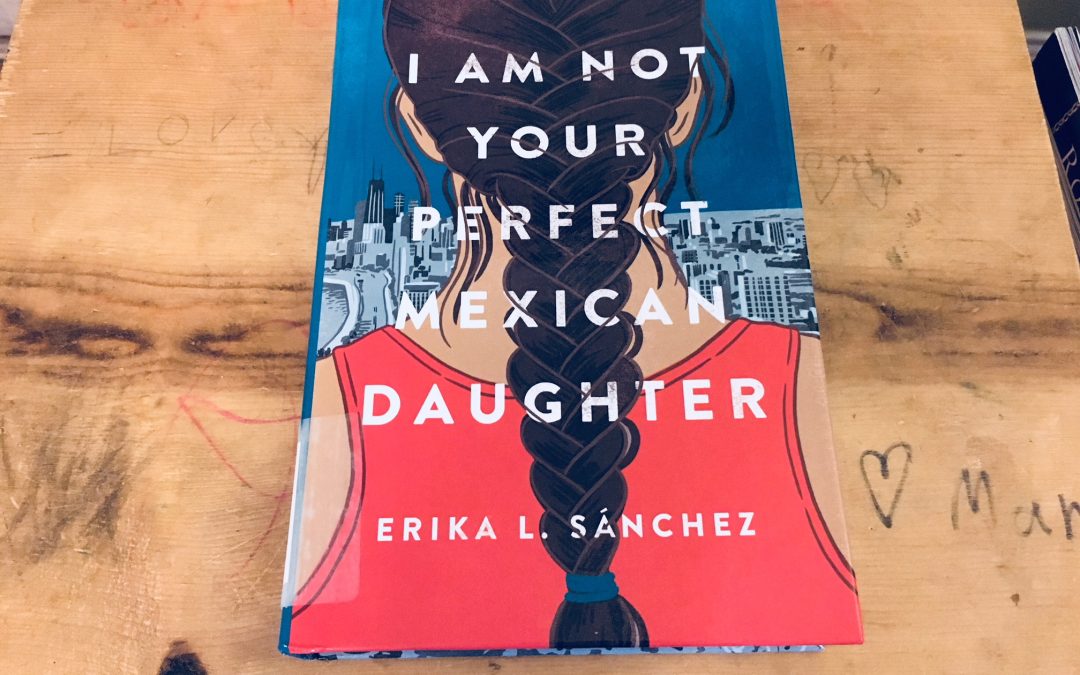
by Rachel Toalson | Books
The book I Am Not Your Perfect Mexican Daughter, by Erika L. Sánchez, has been on my to-read list for a while. I finally got around to reading it last week, and wow! What a book!
I Am Not Your Perfect Mexican Daughter is a young adult literary novel about immigration, depression, family, and believing that something better is possible.
Here are three things I enjoyed most about it:
- The personality. Julia was a fun person to get to know. She wanted more than her parents’ immigrant life, and sometimes that set her at odds with them, but she was a persistent person. She was also the kind of person who was unafraid of hard work; she wanted what she wanted and she was going to work hard to get it. I loved this about her.
- The glimpse into another culture. There was a quinceañera and all the other aspects of the Mexican life that Julia and her family brought to America. Some of my favorite moments of the story were when her parents would talk about Americans; it was great seeing how other cultures look at the United States—always a humbling thing.
- The teenager issues. This book touched on quite a few issues, in a sort of surface-level way, some that many teenagers will face in their lives and others that were unique to Julia because of her culture. There was suicide, sex, depression, the drug cartels in Mexico, abortion, and homosexuality. I enjoyed reading about how a teenager responded to them.
Here’s the opening, which hooks the reader immediately:
“What’s surprised me most about seeing my sister dead is the lingering smirk on her face. Her pale lips are turned up ever so slightly, and someone has filled in her patchy eyebrows with a black pencil. The top half of her face is angry—like she’s ready to stab someone—and the bottom half is almost smug. This is not the Olga I knew. Olga was as meek and fragile as a baby bird.”
The above is an affiliate link. I only recommend books that I personally enjoy. I actually don’t even talk about the books I don’t enjoy, because I’d rather forget I ever wasted time reading them. But if you’re ever curious whether I’ve read a book and whether I liked or disliked it, don’t hesitate to ask.
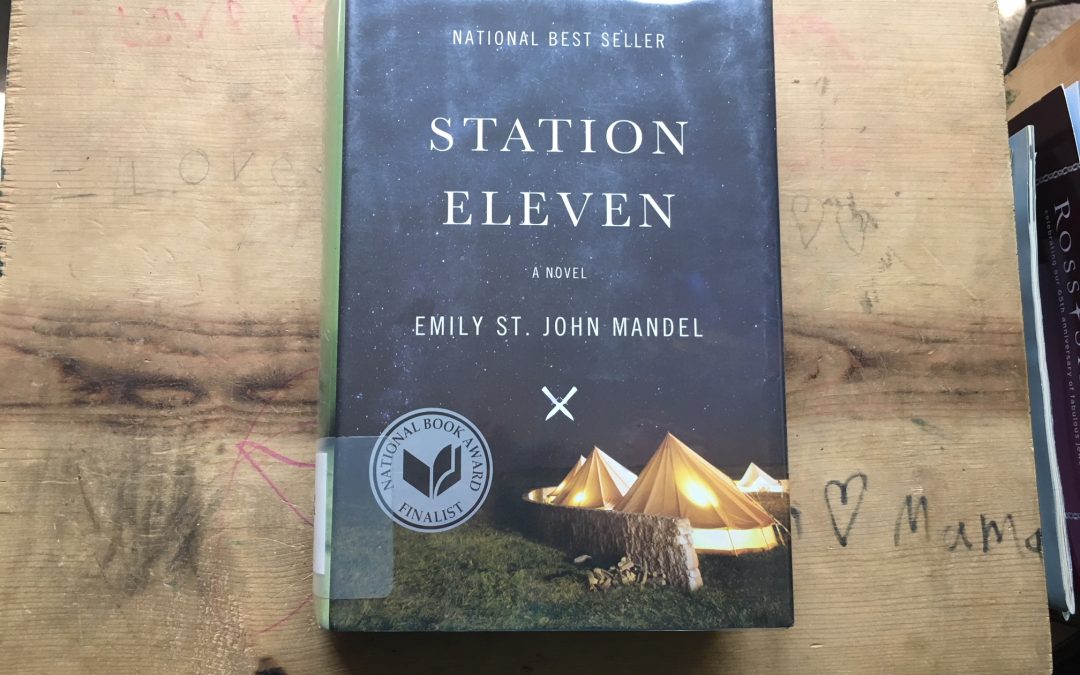
by Rachel Toalson | Books
I don’t read a whole lot of adult novels, but I kept seeing Station Eleven, by Emily St. John Mandel, pop up on my social media feeds, and I decided to give it a try. I’m glad I did.
This is an adult science fiction book that features a post-apocalyptic world, in which a virus called the Georgia flu wipes out everyone.
Here are three things I enjoyed most about it:
The premise: The Georgia flu wiped everyone from the earth, except for a select few, who learned to survive as our ancestors once survived. It was futuristic but had the feel of a step back in time, because there was no Internet or social media channels or even ways to communicate effectively with other people. The people were all spread out, so the earth wasn’t very populated, or didn’t seem so. It was an interesting premise from which to start a story. There was a traveling symphony that met up with some prophets who claimed there was a reason some people survived and others didn’t. It had a cult-like feel that was both intriguing and disturbing.
The structure: The storyline moved from the future, when the virus had already killed most of the world, to the past, where nothing yet had happened. I found this a very interesting method for the storytelling. While most of the people whose stories were told in the “before” section were no longer alive in the “after,” there were some who had carried on, luckily enough, and it was interesting to see where their travels took them.
The characters: Most of the characters were actors or artists, people who had performed on stage and a woman who was writing a comic book called Station Eleven. This comic book connected all the pieces of the story, even though it didn’t seem like an important part of the story. It was a great symbol that linked past to present.
I was hooked by the opening paragraph:
The king stood in a pool of blue light, unmoored. This was act 4 of King Lear, a winter night at the Elgin Theatre in Toronto. Earlier in the evening, three little girls had played a clapping game onstage as the audience entered, childhood versions of Lear’s daughters, and now they’d returned as hallucinations in the mad scene. The king stumbled and reached for them as they flitted here and there in the shadows. His name was Arthur Leander. He was fifty-one years old and there were flowers in his hair.
The above is an affiliate link. I only recommend books that I personally enjoy. I actually don’t even talk about the books I don’t enjoy, because I’d rather forget I ever wasted time reading them. But if you’re ever curious whether I’ve read a book and whether I liked or disliked it, don’t hesitate to ask.
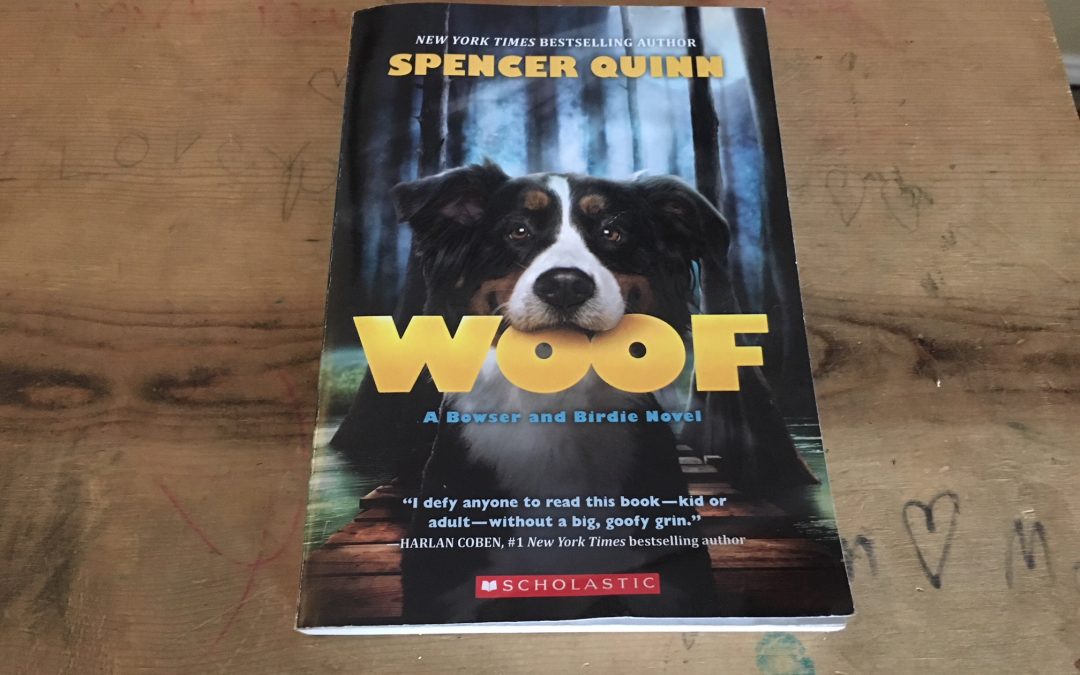
by Rachel Toalson | Books
One of my sons loves stories with dogs. So after he read Woof, by Spencer Quinn, he left it on my bed, along with a note that said, “You have to read this, Mama.” And how could I refuse?
Woof was a sweet, engaging, sometimes humorous mystery, told from the perspective of a dog.
Yes. The perspective of a dog. It was delightful.
Here’s an example, taken from the first page of the book:
Two humans stood outside my cage, a white-haired woman and a gum-chewing kid. Gum chewing is one of the best sounds out there, and the smell’s not bad, either. I liked the kid from the get-go.
They gazed in at me. I gazed out at them. The white-haired woman had blue eyes, washed out and watery. The kid’s eyes were a bright, clear blue, like the sky on a cloudless day. I hadn’t seen the sky in way too long.
“How about this one, Grammy?” the kid said.
The white-haired woman—that would be Grammy, not too hard to make these human-type connections once you get the hang of it—pinched up her face, and it was kind of pinched up to begin with. “Eat us out of house and home.”
The kid cracked her gum. What a sound! I tell you what that does to me, shooting this buzzy feeling all the way from my ears to the tip of my tail and back again. “I don’t know, Grammy,” she said. “Looks thin to me.”
“My point exactly. He’s just waitin’ on some sucker to take him home and fatten him up. Check out the frame on him.”
What a great start!
Here are three things I enjoyed most about it:
The sweetness. This was, at its heart, the story of a girl and her dog and the way they grew to love one another. While there was an intriguing mystery that threaded through it, the real delight of the book came from Birdie and Bowser’s relationship.
The point of view. I’ve already mentioned that the book was told from the perspective of a dog. This made it somewhat silly in some places but also incredibly sweet. Bowser would get lost in a train of thought or he would not know what the humans were talking about or he would try to figure something out as a real dog seems to be trying to figure out. He had a great personality, and Quinn did a fantastic job of portraying an authentic dog with authentic dog-thoughts.
The mystery. Throughout the whole story, Birdie was trying to figure out who stole her grandmother’s prize fish. There were twists and turns and plenty of personality.
After reading Woof, I had to talk to my second son about it. My third son overheard us.
“Did you find out who stole it?” he said.
“Yes,” I said. “But I’m not going to tell you.”
And I’ll say the same to you: you’ll just have to read it.
The above is an affiliate link. I only recommend books that I personally enjoy. I actually don’t even talk about the books I don’t enjoy, because I’d rather forget I ever wasted time reading them. But if you’re ever curious whether I’ve read a book and whether I liked or disliked it, don’t hesitate to ask.
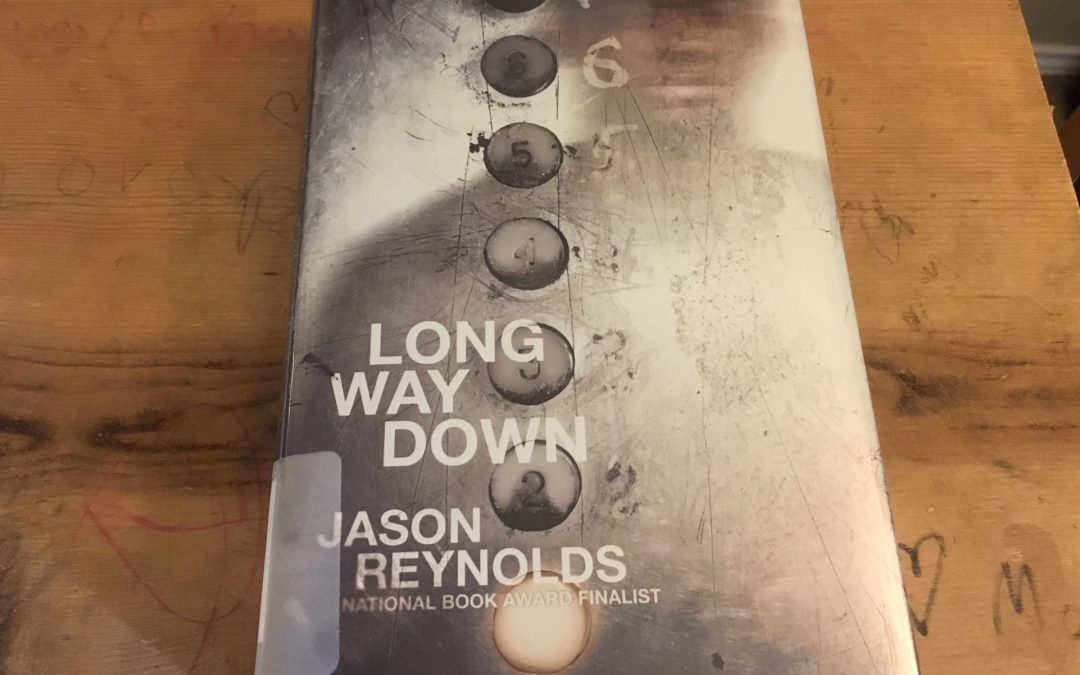
by Rachel Toalson | Books
I’m probably what you could consider a super-fan of Jason Reynolds. I read practically everything he writes—his stories for young adults, his stories for kids, his well-compiled essays that print every so often.
The most recent Reynolds read I picked up was his 2018 Newbery Honor book Long Way Down.
This book is outstanding. Not only is it a fantastically told tale, written in poetry, but it is also an important one—one that examines revenge and gun violence.
Here are three things I enjoyed most about it:
- The story. There’s not a whole lot that happens in this book; it takes place in the span of an elevator ride. But there is still so much that happens this story. A boy examines whether he will seek revenge for his brother’s gun death. He talks with people who have been killed before his brother. He agonizes over his decision. The story was unique and emotional and, at times, difficult.
- The window into gang life. Reynolds highlighted some of the street rules that exist in gang areas. He highlighted the cycles of revenge and violence. I read this book at the same time I was reading a research book on gangs to learn more about them, and I found that I understood them on a much deeper level after reading both books in tandem. There are never simple answers to anything, or simple reasons for why people do what they do. This book proved it.
- The poetry. I’m always a sucker for novels in verse, and this one absolutely did not disappoint. Will’s voice was engaging, connective, and intelligent, and Reynolds’s language was fluid and lyrical.
One of the things I’ve come to know about Reynolds, in reading so many of his books, is that he is a master at giving the voiceless a voice, and this is yet another book that achieves this laudable goal.
Here’s the first sentence, to get you started:
“Don’t nobody
believe nothing
these days…”
The above is an affiliate link. I only recommend books that I personally enjoy. I actually don’t even talk about the books I don’t enjoy, because I’d rather forget I ever wasted time reading them. But if you’re ever curious whether I’ve read a book and whether I liked or disliked it, don’t hesitate to ask.






